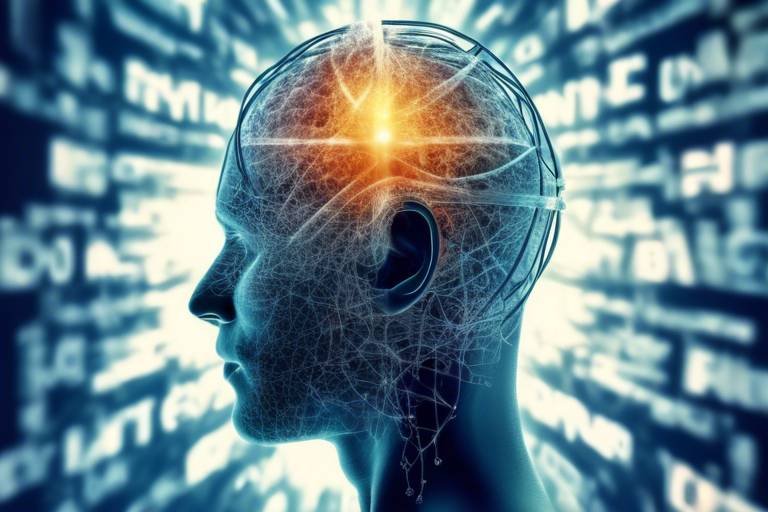How Ontology Helps Us Understand the Conscious Mind
Have you ever wondered what it really means to be conscious? Or how we can even begin to understand the complexities of our own minds? Ontology, the philosophical study of being and existence, plays a crucial role in unraveling these mysteries. By examining the fundamental nature of consciousness through an ontological lens, we gain insights that not only deepen our understanding of ourselves but also illuminate the intricate relationship between mind and reality.
As we journey through the realms of consciousness, we find ourselves grappling with profound questions: What does it mean to exist? How do our thoughts and perceptions shape our reality? These inquiries are at the heart of ontology, which serves as a framework for analyzing the various states of consciousness. In this article, we will explore how ontology intersects with consciousness, diving into its definitions, implications, and applications across philosophy, psychology, and neuroscience.
Imagine consciousness as a vast ocean, with each wave representing different states of awareness and perception. Some waves are gentle and calm, representing the everyday experiences we encounter, while others crash violently, symbolizing the profound moments of self-awareness and intentionality. By using ontology to map these waves, we can better understand the currents that drive our thoughts and actions.
Throughout this exploration, we will uncover the layers of consciousness that exist beneath the surface. From the subjective experiences of phenomenal consciousness to the more accessible aspects of access consciousness, ontology helps us categorize and analyze these mental states. By doing so, we not only grasp the essence of consciousness but also appreciate the complexities that define our existence.
So, buckle up as we dive into the depths of ontology and consciousness, unraveling the threads that connect our minds to the very fabric of reality. The journey promises to be enlightening, revealing how these philosophical concepts shape our understanding of what it means to be truly conscious.
- What is ontology? Ontology is the philosophical study of being and existence, focusing on the nature of reality.
- How does ontology relate to consciousness? Ontology provides a framework for analyzing the various states of consciousness, helping us understand the complexities of the mind.
- What are the types of consciousness? The main types include phenomenal consciousness (subjective experiences) and access consciousness (the ability to report experiences).
- Why is understanding consciousness important? Grasping the nature of consciousness helps us understand human behavior, mental states, and the relationship between mind and reality.

Understanding Ontology
Ontology is a branch of philosophy that dives deep into the essence of being and existence. It's like the ultimate detective, investigating what it means for something to exist and how different entities relate to one another. Imagine trying to piece together a puzzle where the pieces represent different aspects of reality—ontology helps us understand how these pieces fit together to form a coherent picture of our world. At its core, ontology seeks to answer fundamental questions about the nature of reality, such as: What is existence? What categories of things exist? How do these categories interact? These inquiries are crucial when we try to unravel the complexities of consciousness.
To grasp ontology's role in understanding consciousness, we need to explore several key concepts:
- Being: This refers to anything that exists, whether it's a physical object, an idea, or an abstract concept.
- Entities: These are the things that populate our ontology—everything from trees and rocks to thoughts and emotions.
- Categories: Ontology categorizes entities into different types, helping us understand their relationships and hierarchies.
By establishing a framework for analyzing these concepts, ontology provides a lens through which we can examine consciousness. For instance, when we consider the nature of thoughts and emotions, we can categorize them as mental states that exist in a specific ontological framework. This categorization helps us understand how these states relate to one another and how they contribute to our overall conscious experience.
Moreover, ontology encourages us to think about consciousness not just as a static state but as a dynamic interplay of various entities and categories. It prompts us to ask questions like: How do our beliefs shape our perceptions? What role do emotions play in our conscious experiences? By exploring these questions, ontology serves as a vital tool for dissecting the intricate layers of consciousness.
In summary, ontology is not just an abstract philosophical exercise; it's a practical framework that enriches our understanding of consciousness. By examining the fundamental concepts of being, entities, and categories, we can better appreciate the complexities of the mind and the myriad ways it interacts with the world around us.

The Nature of Consciousness
Consciousness is one of those fascinating topics that can boggle the mind, isn't it? It's like trying to catch smoke with your bare hands. At its core, consciousness encompasses our awareness and perception of the world around us. But what does that really mean? To put it simply, consciousness is our ability to experience thoughts, feelings, and sensations. It's the inner voice that narrates our lives, the lens through which we view reality, and the essence of what it means to be alive.
When we dive deeper into the nature of consciousness, we encounter two key characteristics: self-awareness and intentionality. Self-awareness is that magical moment when you realize you're not just a passive observer; you're an active participant in your own life story. It's that moment of reflection when you think, "Wow, I'm really here, experiencing this." Intentionality, on the other hand, refers to the capacity of our thoughts to be about something. When you think about your favorite meal, your mind is directed toward that specific experience, showcasing how consciousness is not just a random collection of thoughts but a purposeful engagement with the world.
So how does ontology tie into all of this? Well, ontology, as the study of being and existence, provides a framework for analyzing these complex phenomena. It helps us categorize different states of consciousness and understand their implications. For instance, consider the distinction between phenomenal consciousness and access consciousness. Phenomenal consciousness refers to the raw, subjective experience of perceptions—like the vivid colors of a sunset or the taste of chocolate melting in your mouth. It's the "what it's like" aspect of consciousness, something deeply personal and often indescribable.
In contrast, access consciousness deals with the ability to access and report those experiences. It's the part of consciousness that allows you to articulate your thoughts, share your feelings, or even write down your reflections. This distinction is crucial because it helps us understand that while we may have rich, subjective experiences, our ability to communicate and reflect on those experiences can vary greatly.
To illustrate the connection between ontology and these types of consciousness, let's consider a simple table:
| Type of Consciousness | Description | Ontology Implications |
|---|---|---|
| Phenomenal Consciousness | Subjective experience of perceptions | Highlights the complexity of individual experience |
| Access Consciousness | Ability to report and access experiences | Demonstrates the functional aspects of consciousness |
By examining these different types of consciousness through an ontological lens, we can gain a richer understanding of what it means to be conscious. It's not just about being awake or aware; it's about the intricate dance of experiences that shape our perception of reality. This exploration opens up new avenues for understanding the mind and its complexities, allowing us to appreciate the depth and richness of human experience.
In conclusion, the nature of consciousness is a multifaceted subject that invites us to ponder our very existence. Through the lens of ontology, we can begin to unravel the intricate layers of awareness and perception, shedding light on the profound questions of what it means to be conscious. So, the next time you find yourself lost in thought, remember: you're not just thinking; you're engaging in a complex interplay of consciousness that defines your experience of the world.
- What is consciousness? Consciousness is our awareness of ourselves and our environment, encompassing thoughts, feelings, and perceptions.
- What is the difference between phenomenal and access consciousness? Phenomenal consciousness relates to the subjective experience of perceptions, while access consciousness refers to the ability to report and access those experiences.
- How does ontology relate to consciousness? Ontology provides a framework for analyzing the different states of consciousness, helping us understand their implications and relationships.

Types of Consciousness
When we dive into the fascinating world of consciousness, it’s like opening a treasure chest filled with different jewels, each representing a unique aspect of our mental experience. Consciousness is not a monolith; rather, it encompasses a variety of states that shape how we perceive the world and ourselves. Broadly speaking, we can categorize consciousness into several types, each with its own nuances and implications.
One of the primary distinctions we often encounter is between phenomenal consciousness and access consciousness. These two types serve as fundamental pillars in our understanding of what it means to be aware. Phenomenal consciousness refers to the rich tapestry of subjective experiences—think of it as the vivid colors, sounds, and sensations that fill our daily lives. It’s that feeling you get when you taste your favorite food or hear a moving piece of music. This type of consciousness is deeply personal and often difficult to articulate, as it’s rooted in our individual experiences.
On the other hand, access consciousness is more about functionality. Imagine it as the operating system of your mind, allowing you to access, report, and utilize your experiences. This type encompasses the mental processes that enable you to think, reason, and make decisions based on your perceptions. For instance, when you recall a memory or articulate a thought, you’re tapping into access consciousness. It’s the bridge between your internal experiences and your external expressions.
To further illustrate these concepts, let's break down some key features of both types of consciousness in the table below:
| Type of Consciousness | Description | Examples |
|---|---|---|
| Phenomenal Consciousness | The subjective experience of perceptions. | Feeling joy, tasting sweetness, seeing colors. |
| Access Consciousness | The ability to access and report experiences. | Recalling a memory, solving a problem, making a decision. |
Understanding these types of consciousness not only enriches our grasp of the mind but also highlights the intricate relationship between our experiences and our cognitive functions. It raises intriguing questions: How do these types interact? Can one exist without the other? As we explore these questions, we begin to appreciate the complexity of consciousness and its profound implications for our understanding of the self.
In addition to phenomenal and access consciousness, there are other nuanced categories worth mentioning, such as self-consciousness and collective consciousness. Self-consciousness, for instance, involves an awareness of oneself as an individual distinct from others, often accompanied by introspection and self-reflection. Collective consciousness, on the other hand, refers to the shared beliefs, ideas, and moral attitudes that operate as a unifying force within a group, shaping social norms and cultural practices.
In summary, the types of consciousness are not merely academic concepts; they are the building blocks of our everyday experiences. By recognizing the different forms consciousness can take, we gain valuable insights into the very nature of existence itself. As we continue to peel back the layers of consciousness, we find ourselves on a journey of self-discovery that is as exciting as it is enlightening.

The Role of Phenomenal Consciousness
Phenomenal consciousness is a fascinating topic that dives deep into the essence of our subjective experiences. Imagine standing in a bustling market, the vibrant colors of fruits and vegetables catching your eye, the delightful aroma of spices wafting through the air, and the cacophony of voices surrounding you. This rich tapestry of sensations is what phenomenal consciousness is all about—it encapsulates the personal experience of being aware and alive in the moment. It’s not just about having thoughts or being awake; it’s about the quality of those experiences and how they shape our perception of reality.
To understand phenomenal consciousness, we need to consider its implications for ontology—the study of being. This aspect of consciousness raises important questions: What does it mean to experience something? How do these experiences contribute to our understanding of existence? Phenomenal consciousness serves as a bridge between our inner world and the external environment, allowing us to interpret and react to stimuli in a meaningful way. It’s like the lens through which we view our lives, coloring our thoughts and feelings in ways that are uniquely our own.
One of the critical components of phenomenal consciousness is its subjectivity. Each person’s experience is distinct, shaped by their history, emotions, and cognitive processes. For instance, two people can witness the same sunset, but one may feel a sense of tranquility while the other feels a pang of nostalgia. This subjectivity is vital for ontology because it emphasizes the individual nature of existence and challenges the notion of a universal experience. In a way, it’s like each of us has our own personal filter through which reality is perceived.
Furthermore, phenomenal consciousness is intertwined with the concept of intentionality, which refers to the ability of our mental states to be about something. When we experience a thought or feeling, it’s always directed toward an object, whether it’s a memory, a desire, or a sensory perception. This directedness is crucial for understanding how we navigate our world. For example, when you think about your favorite meal, your mind conjures up images, smells, and tastes that are inherently tied to that experience. This connection between thought and experience enriches our understanding of consciousness and existence.
In summary, phenomenal consciousness is not just a passive state of awareness; it is a dynamic and intricate part of our being that shapes how we interact with the world. By examining its role within the framework of ontology, we gain valuable insights into the nature of existence itself. It prompts us to ask profound questions about what it means to be conscious and how our experiences define our reality. As we continue to explore this fascinating territory, we uncover layers of complexity that challenge our understanding of both the mind and the essence of being.

The Role of Access Consciousness
Access consciousness is a fascinating aspect of our mental landscape, acting as a bridge between our subjective experiences and the external world. It refers to the ability to access, report, and utilize our experiences in a way that is coherent and communicable. Think of it as the spotlight that illuminates certain thoughts or sensations, allowing us to bring them into our conscious awareness and articulate them when necessary. While phenomenal consciousness provides the rich tapestry of our subjective experiences, access consciousness is like the stage manager, guiding which parts of that tapestry we can actively engage with and express.
This distinction is crucial because it highlights how our minds operate on different levels. For instance, we might have a fleeting thought or sensation—like the taste of chocolate melting on our tongue—that exists in our phenomenal consciousness. However, unless we can access that experience and articulate it, it remains an unexpressed whisper in the vastness of our mind. Access consciousness allows us to take those whispers and transform them into meaningful dialogue, both with ourselves and others.
Moreover, access consciousness is not merely about verbal expression; it encompasses a broader spectrum of cognitive functions. It enables us to make decisions, solve problems, and engage in reflective thinking. When we ponder a question like, "What should I have for dinner?" we are tapping into our access consciousness to retrieve relevant memories, preferences, and options. This process is essential for navigating the complexities of daily life, as it empowers us to act based on our awareness and understanding of our experiences.
To illustrate the significance of access consciousness, let’s consider a few key implications:
- Decision Making: The ability to access relevant information influences our choices and actions. Access consciousness allows us to weigh options and outcomes effectively.
- Social Interaction: Being able to access and communicate our thoughts and feelings is vital for interpersonal relationships. It fosters empathy and understanding.
- Self-Reflection: Access consciousness is crucial for introspection, enabling us to examine our beliefs, desires, and motivations.
In essence, access consciousness is a powerful tool that shapes our interactions with the world. It allows us to navigate our mental landscape, ensuring that we can articulate our experiences and engage meaningfully with our environment. Understanding access consciousness not only enhances our comprehension of the mind but also provides practical insights into improving our cognitive and emotional well-being.
- What is the difference between phenomenal and access consciousness?
Phenomenal consciousness refers to the subjective experience of sensations, while access consciousness involves the ability to report and utilize those experiences in cognitive processes. - Why is access consciousness important?
Access consciousness is essential for decision-making, social interactions, and self-reflection, allowing individuals to engage fully with their experiences. - Can access consciousness be impaired?
Yes, conditions such as brain injuries or certain mental health disorders can impair access consciousness, affecting an individual's ability to articulate thoughts and experiences.

Ontology and Mental States
When we talk about mental states, we're diving into the essence of what it means to think, feel, and experience life. These mental states—like beliefs, desires, and intentions—are not just abstract concepts; they are the building blocks of our consciousness. Understanding how ontology relates to these states allows us to unpack the complexities of the mind and how it operates in different contexts. Think of ontology as a map that helps us navigate the intricate landscape of our thoughts and feelings.
At its core, ontology provides a framework for categorizing mental states. It helps us answer fundamental questions: What is a belief? How does it differ from a desire? And what does it mean to intend something? By examining these questions through an ontological lens, we can better understand the relationships between different mental states and how they influence our behavior.
For instance, consider the distinction between beliefs and desires. Beliefs can be seen as representations of reality, while desires are more about what we want to achieve or obtain. This distinction is crucial because it shapes how we interact with the world. If you believe it will rain tomorrow, you might carry an umbrella. However, if you desire to go for a walk, that belief might be overridden by your desire to enjoy the outdoors. Ontology helps us delineate these nuances, providing clarity to our thought processes.
Moreover, ontology allows us to explore the interconnections between mental states. For example, how does a belief influence a desire? Or how do emotions, which are also mental states, interact with our intentions? By mapping out these relationships, we can gain insights into human behavior that are not only philosophical but also practical. This understanding can inform various fields, from psychology to artificial intelligence, where replicating human thought processes is essential.
To illustrate this further, let’s take a look at a simple table that outlines some key mental states and their characteristics:
| Mental State | Description | Example |
|---|---|---|
| Belief | A conviction that something is true or exists. | Thinking that the sky is blue. |
| Desire | A feeling of wanting to have something. | Wanting to eat ice cream. |
| Intention | A mental state that represents a commitment to carrying out an action. | Planning to go to the gym tomorrow. |
| Emotion | A complex psychological state that involves a subjective experience. | Feeling happy or sad. |
In this table, we can see how each mental state has its own unique characteristics, yet they all interact within our conscious experience. Ontology encourages us to think critically about these interactions, prompting us to ask: How do these states coexist? What happens when they conflict? By framing our understanding of mental states ontologically, we can begin to unravel the deeper meanings behind our thoughts and actions.
Ultimately, the study of ontology and mental states is not just an academic exercise; it has real-world implications. Whether in therapy, education, or even in everyday decision-making, understanding how our mental states interact can lead to better outcomes. So, the next time you find yourself grappling with a decision or feeling torn between conflicting desires, remember that these mental states are part of a larger ontological landscape that shapes your consciousness.
- What is ontology? Ontology is the philosophical study of being and existence, focusing on the nature and relations of being.
- How does ontology relate to mental states? Ontology provides a framework for categorizing and understanding mental states, helping us explore their relationships and implications.
- Why is understanding mental states important? Understanding mental states can enhance our knowledge of human behavior, inform psychological practices, and improve decision-making.

Implications for Psychology
When we dive into the fascinating intersection of ontology and psychology, it's like opening a door to a treasure trove of insights about human behavior and mental processes. Ontology, the philosophical study of being and existence, provides a profound framework that helps psychologists understand the complex layers of consciousness. By asking fundamental questions about what it means to exist and how we perceive our reality, psychologists can better analyze behaviors, thoughts, and emotions.
One of the most intriguing aspects of this relationship is how ontological perspectives can shape psychological theories. For instance, consider the way we define mental states. Are they merely byproducts of biological processes, or do they hold a deeper existential significance? This question can lead to various therapeutic approaches. Recognizing the importance of mental states can help psychologists develop more effective interventions and treatment plans tailored to individual experiences.
Moreover, ontology encourages psychologists to explore the subjective experiences of their clients. By acknowledging that each person's reality is shaped by their unique perceptions, psychologists can cultivate a more empathetic and nuanced understanding of their clients' struggles. This approach not only enhances the therapeutic alliance but also fosters a more personalized treatment strategy.
In practice, this means that psychologists can benefit from integrating ontological concepts into their assessments and interventions. For example, they might consider the following:
- How do clients perceive their mental states?
- What existential questions are influencing their behavior?
- In what ways do personal beliefs shape their understanding of reality?
By asking these questions, psychologists can tap into the rich tapestry of human consciousness, leading to more profound insights and potentially transformative outcomes. Moreover, this ontological lens can illuminate the ways in which cultural and social contexts influence individual experiences, thereby enhancing the effectiveness of psychological practices.
Furthermore, the implications of ontology extend into various branches of psychology, including clinical psychology, developmental psychology, and even social psychology. For example, in clinical settings, understanding the ontological dimensions of a client's experience can provide critical insights into their mental health challenges. In developmental psychology, recognizing how children's understanding of existence evolves can inform educational practices and parenting strategies.
Ultimately, the integration of ontology into psychology not only enriches our understanding of the mind but also empowers psychologists to approach their work with a greater sense of depth and meaning. It's a reminder that behind every behavior lies a complex web of beliefs, perceptions, and existential questions, waiting to be explored.
- What is ontology in psychology? Ontology in psychology refers to the philosophical study of being and existence as it relates to understanding mental states and consciousness.
- How does ontology influence psychological theories? It shapes the way psychologists conceptualize mental states, behaviors, and the subjective experiences of individuals.
- Can ontology improve therapeutic practices? Yes, by recognizing the unique perceptions and existential questions of clients, psychologists can create more personalized and effective treatment strategies.

Ontology in Cognitive Science
When we dive into the fascinating world of cognitive science, one can't help but notice how ontology serves as a guiding light, illuminating the intricate pathways of the mind. Cognitive science is, at its core, an interdisciplinary field that seeks to understand the processes of thought, learning, and perception. But how does ontology fit into this puzzle? It provides a foundational framework for examining concepts like representation, computation, and the very nature of mental states. Just imagine trying to navigate through a dense fog without a map; that's what studying cognitive processes would feel like without ontological insights.
One of the most significant contributions of ontology to cognitive science is its ability to clarify complex concepts. For instance, when we talk about mental representations, ontology helps us delineate what these representations are and how they relate to the external world. By establishing a clear ontological framework, researchers can better articulate the differences between various types of representations—be it symbolic, iconic, or indexical. This clarity is crucial, as it allows scientists to construct more precise models of cognitive functions.
Moreover, ontology encourages cognitive scientists to ask the right questions. For example, what does it mean for a thought to exist? Is a thought merely a fleeting mental image, or does it hold a more substantial existence within our cognitive architecture? These inquiries lead to deeper explorations of how we process information and how our mental states interact with our environment. In this sense, ontology acts as a catalyst for innovation in cognitive theories.
Let's consider a few key ontological concepts that are particularly relevant in cognitive science:
- Representation: The way in which information is symbolically encoded in the mind.
- Computation: The processes that manipulate these representations to produce thought and behavior.
- Intentionality: The capacity of the mind to direct itself toward objects or states of affairs.
These concepts not only enhance our understanding of cognitive processes but also provoke further inquiry into the nature of consciousness itself. For instance, when we analyze how representations are formed and utilized, we begin to unravel the complexities of how we perceive reality. Are our mental representations accurate reflections of the world, or are they merely constructs shaped by our experiences and biases? Such questions underscore the importance of ontology in cognitive science, as they push the boundaries of our understanding and challenge existing paradigms.
In summary, ontology is not just a philosophical abstraction; it is a vital component of cognitive science that enriches our understanding of the mind. By providing a robust framework for analyzing concepts like representation and computation, ontology fosters a deeper comprehension of cognitive processes. As we continue to explore the interplay between ontology and cognitive science, we open up new avenues for research and discovery, ultimately leading to a more profound understanding of what it means to think, learn, and be conscious.

Ontology and Neurophilosophy
Neurophilosophy is a fascinating field that merges the insights of neuroscience with philosophical inquiry, particularly focusing on the nature of consciousness. At its core, this discipline raises profound questions about how our mental states correlate with brain processes. Here, ontology plays a pivotal role, as it provides a structured framework for examining these complex relationships. By exploring the fundamental nature of being and existence, ontology helps us dissect what it means to be conscious, and how this consciousness is manifested in our neural architecture.
One of the key challenges in neurophilosophy is understanding the relationship between the physical brain and the subjective experience of consciousness. Ontological questions arise, such as: Is consciousness merely a byproduct of brain activity, or does it exist independently of the physical substrate? These inquiries push us to contemplate the essence of our experiences and the reality of our mental states. For instance, consider the distinction between qualia—the subjective qualities of experiences, like the taste of chocolate—and the physical processes that occur in the brain when we eat it. Ontology encourages us to analyze these differences and their implications for our understanding of consciousness.
Furthermore, neurophilosophy often engages with the concept of dualism versus physicalism. Dualism posits that mental phenomena are non-physical, while physicalism asserts that everything, including consciousness, is fundamentally physical. The ontological implications of these positions are significant, as they dictate how we interpret mental states in relation to brain states. For example, if we adopt a dualistic perspective, we might argue that consciousness cannot be fully explained by neural processes alone. On the other hand, a physicalist viewpoint would suggest that all mental states can be traced back to specific brain functions.
To illustrate the intersection of ontology and neurophilosophy further, consider the following table that summarizes key philosophical positions regarding consciousness:
| Philosophical Position | Description | Ontological Implications |
|---|---|---|
| Dualism | Consciousness exists independently of the brain. | Suggests a separation between mind and body. |
| Physicalism | Consciousness is a product of brain activity. | All mental states can be reduced to physical processes. |
| Functionalism | Mental states are defined by their functional roles. | Focuses on the processes rather than the substance. |
As we navigate these philosophical waters, it becomes clear that ontology does not merely serve as an abstract theory; it is instrumental in shaping how we approach questions of consciousness and the mind. By providing a lens through which we can examine the nature of existence, ontology enables us to engage more deeply with the implications of neurophilosophical debates. It challenges us to think critically about the relationship between our experiences and the underlying biological mechanisms, ultimately enriching our understanding of what it means to be conscious.
In conclusion, the interplay between ontology and neurophilosophy is essential for unraveling the mysteries of the conscious mind. As we continue to explore these connections, we gain valuable insights that can lead to more profound questions about our existence and the nature of reality itself.
- What is ontology? Ontology is the philosophical study of being and existence, focusing on the nature of reality and the relationships between entities.
- How does ontology relate to consciousness? Ontology provides a framework for understanding the nature of consciousness, helping to categorize and analyze mental states and their implications.
- What is neurophilosophy? Neurophilosophy is a field that integrates neuroscience and philosophy to explore questions about the mind, consciousness, and their relationship to brain processes.
- Why is the relationship between brain and consciousness important? Understanding this relationship can help us clarify the nature of our experiences and the underlying mechanisms that produce them, informing both scientific and philosophical inquiries.
Frequently Asked Questions
- What is ontology and why is it important in understanding consciousness?
Ontology is the philosophical study of being and existence. It helps us frame our understanding of consciousness by providing a structured way to analyze what it means to be conscious, the nature of existence, and the characteristics that define our mental states.
- What are the different types of consciousness?
Consciousness can be categorized mainly into two types: phenomenal consciousness, which refers to the subjective experience of perceptions, and access consciousness, which is about the ability to access and report those experiences. Both types play a critical role in how we understand our mental life.
- How does ontology relate to mental states like beliefs and desires?
Ontology provides a framework for categorizing and analyzing mental states such as beliefs and desires. By examining these states ontologically, we can gain insights into their nature, how they interact, and their implications for our understanding of consciousness.
- What implications does ontology have for psychology?
Ontology informs psychological theories by offering deeper insights into human behavior. It helps psychologists understand how different mental states and consciousness types influence actions, decisions, and emotional responses, enriching the field of psychology.
- How does cognitive science benefit from an ontological perspective?
Cognitive science gains clarity on concepts like representation and computation through ontological frameworks. These frameworks help us better understand cognitive processes and how they relate to consciousness, ultimately leading to a more comprehensive view of the mind.
- What role does neurophilosophy play in the study of consciousness?
Neurophilosophy bridges neuroscience and philosophy, raising important questions about the nature of consciousness. Ontology informs these debates, providing a philosophical context to the findings from neuroscience and enhancing our understanding of the conscious mind.



















